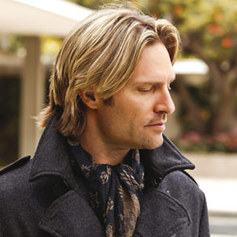
A bum rap is a hard thing to beat. That’s the problem “contemporary classical” music faces today, thanks to the audience-unfriendly composers of the post-World War II decades.
But those composers – Karlheinz Stockhausen, Pierre Boulez, Milton Babbitt and many others – who did such a fine job of alienating audiences half a century ago, have pretty much faded from the scene. More and more, composers today are writing with a sympathetic understanding of what people really want to hear.
Eric Whitacre
Choral Music
Naxos
Eric Whitacre is currently a star in the choral world, and this disc certainly helps to explain why. His music is rich, resonant and entirely suited to the choral medium. Mind you, it helps that the choir recorded on this work – Noel Edison’s Elora Festival Singers – is one of the finest vocal ensembles on the continent.
From the first track on this disc of 11 mostly short, mostly unaccompanied works – Her Sacred Spirit Soars – Whitacre’s choral textures shine radiantly. This is meditative music, but it also has an underlying power in it. For instance, When David Heard (the longest work on the disc) is built of short, furtive phrases that coalesce into an outburst of ecstasy.
Whitacre has been compared to such contemporary composers as Arvo Pärt and John Tavener, for good reasons. But this music is also touched by such disparate influences as Renaissance polyphony and Southern shape-note traditions.
Steve Reich
WTC 9/11
Nonesuch
Just before it was released earlier this year, Steve Reich’s latest CD, featuring his WTC 9/11, was caught up in a messy debate about the cover art. (The original idea was a graphic image of a plane crashing into the World Trade Center, but the final release featured a cloud of white smoke against a blue sky.) This was all very unfortunate, as the controversy took attention away from the music.
The title work, in three movements, features the Kronos Quartet with recorded voices of witnesses to the 9/11 attacks on New York. Reich’s minimalist style, with its insistent urgency, is well suited to this dramatic yet tasteful commentary on these events. This isn’t “easy listening” – but it’s compelling, from start to finish.
The disc also includes two Reich works with sunnier dispositions. His Mallet Quartet is performed by So Percussion with calm, reassuring authority. (A bonus DVD of the So players playing the piece comes with the CD.) And Dance Patterns, performed here by Steve Reich and Musicians, is a cheerful swath of rhythm and texture.
Robert Moran
Trinity Requiem
Innova
Here’s another, quite different, 9/11 commemoration. The “Trinity” in the title is a reference to Trinity Church on Wall Street in New York, just a few blocks from Ground Zero. This Requiem was commissioned by the church, and is scored for youth choir (Trinity Youth Chorus), organ, harp and strings. It is conducted by Robert Ridgell.
From the big opening organ chords, it’s pretty clear Trinity Requiem is intended as a solemn and monumental work. In this regard, it doesn’t disappoint – but much of the music also has an intimate, peaceful quality. It’s a straightforward and moving setting of the Latin text, in the spirit of requiems by Gabriel Fauré and Maurice Duruflé.
This disc also includes Moran’s rich Seven Sounds Unseen and Notturno in Weiss.
Michael Daugherty
Route 66
Naxos
Michael Daugherty’s Route 66 sets the pace for this CD, with its bright orchestral colors and boisterous, jazzy energy – something like Leonard Bernstein’s music from West Side Story. Conductor Marin Alsop leads the Bournemouth Symphony through this romp.
And there’s lots more on this disc. Daugherty’s three-movement Ghost Ranch recalls Ferde Grofé and even spaghetti Western soundtracks – but in sophisticated ways that greatly exceed his sources of inspiration.
Sunset Strip begins with a phrase from the Hawaii Five-O theme music – but soon develops into an elaborate fantasia. The three-movement score also contains a brassy and untranquil Nocturne and a Latin-tinged finale called 7 AM.
Finally, Time Machine presents Daugherty’s view of the past and future, with the past grandly lyrical, gradually building in strength – and the future tantalizing with arcane, sometimes jarring, mysteries.
Peter-Anthony Togni
Lamentatio Jeremaie
ECM New Series
Choir and bass-clarinet sounds like an unlikely combination of musical forces. But Togni, (a Canadian composer) has teamed up with Toronto’s Elmer Iseler Singers and bass clarinetist Jeff Reilly to create a powerful and expansive work that he calls “a concerto on texts from the Book of Lamentations.”
The choir, under Lydia Adams, sounds great. But what makes this work so unique and fascinating is Reilly’s performance: He’s a virtuoso of contemporary techniques, and Togni has given him plenty of room to show off what he can do. As well, it’s to the composer’s credit that he has managed to successfully marry tonal harmonies to some very “outside” improvisations in the bass clarinet.
As the texts Togni has chosen would suggest, this is mournful, sometimes angry, music. But it’s also hauntingly beautiful and deeply expressive.
© Colin Eatock 2011
 RSS Feed
RSS Feed

